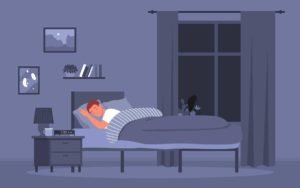Sleep is as important to our health as eating, drinking, and breathing. It allows our bodies to repair themselves and our brains to consolidate our memories and process information. Poor sleep is linked to physical problems such as a weakened immune system and mental health problems such as anxiety and depression. Sleep deprivation can leave you feeling irritable and exhausted in the short term, but it can also have serious long-term health consequences as well. Lack of sleep is linked to a number of unfavorable health consequences including heart disease, type 2 diabetes, and depression. Sleep deprivation results in mood changes including increased irritability and anger can make it much harder to cope with even the minor stresses of daily life.

Insomnia and other sleep problems can be a symptom of depression, but more recently, research has implicated lack of sleep in actually causing depression.
As with many other psychological conditions, the relationship between sleep and anxiety appears to go in both directions. People with anxiety tend to experience more sleep disturbances, but experiencing sleep deprivation can also contribute to feelings of anxiety. This can become a cycle that perpetuates both sleep and anxiety issues. Sleep problems can mean cognitive impairments, such as a decrease in learning and attention capabilities, long-term memory, language development, and emotions.
Our bodies, finely tuned machines that they are, have different control centers to regulate what we do and when we do it. These control centers are mostly governed by the environment and our genes. Probably the most well-known of these biological rhythms is the circadian rhythm. It controls most of our biological and behavioral functions.
the circadian rhythm helps manage this process. So when it is dysregulated, the body doesn’t get the opportunity to get in sync. As a result, motor, emotional, and interpersonal functioning is altered.

What’s more:-
Sleep allows for this alignment to happen. It’s almost like the body’s chance to wind all the organ’s clocks to keep them running along the same time. And, it explains why you feel edgy or emotional when you’re overtired.
Behaviors such as retiring and waking at the same time each night or doing a relaxing activity, such as reading, before bed are all possible ways to help get into a groove and reset the daily (as well as the circadian) rhythm. All of which might help lessen those sleepless nights and those grumpy, anxious days.
Here are some ways to have a peaceful sleep:-
![]() Watch what you consume.
Watch what you consume.
![]() Avoid consuming caffeine, alcohol, or sugar before bedtime, or eating large meals.
Avoid consuming caffeine, alcohol, or sugar before bedtime, or eating large meals.
![]() Curb screen use. Shut down electronic, screened devices at least a half-hour before you plan to sleep, as the blue light they emit stimulates the brain.
Curb screen use. Shut down electronic, screened devices at least a half-hour before you plan to sleep, as the blue light they emit stimulates the brain.
![]() Clean your bed and organize your room before sleeping so you wake up to a clean room which will act as a good start to your day.- Try meditating or listening to calming music, white noise, or sleep affirmations.
Clean your bed and organize your room before sleeping so you wake up to a clean room which will act as a good start to your day.- Try meditating or listening to calming music, white noise, or sleep affirmations.
![]() Having a glass of warm milk before bed helps in releasing melatonin, which controls our sleep pattern.
Having a glass of warm milk before bed helps in releasing melatonin, which controls our sleep pattern.



